Top Ten Human Medications that are Toxic for your Dog

Just as you would never share your prescription with your two-legged children, you also shouldn’t share it with your dog…no matter how much it helps you with the same problem your dog has.
From the American Veterinary Medical Association
Here are the top ten medications that should never be given to a dog.
Venlafaxine, also known by the brand name Effexor, is a popular antidepressant. For you. In an animal, it can cause agitation, tremors and even seizures. The AVMA notes that cats, especially, like to eat these, but they would likely cause trouble for your dog, as well.
Duloxetine, the generic name for Cymbalta, is also an antidepressant and causes the same problem for your dog as Venlafaxine can.
Naproxen, found in Aleve and Naprosyn, can cause stomach ulcers and kidney failure if given to a dog. The best pain reliever for a dog is plain old aspirin.
Acetaminophen, the active ingredient in Tylenol, can cause liver damage and can render a dog’s red blood cells ineffective at carrying oxygen to the body’s organs.
Clonazepam (Klonipin) helps prevent convulsions, insomnia, and anxiety in humans. In dogs, the drug will not only make your dog fall asleep, it may also lower his blood pressure to dangerous levels.
Zolpidem, which makes up Ambien, is a sleep aid. Now think about where you take a sleeping pill. Many people set it on the night stand so they don’t have to get out of bed at midnight when they haven’t been able to fall asleep. Most dogs can easily reach the top of the nightstand to steal whatever they find there. Dogs who ingest Zolpidem will become very agitated and their heart rates will become dangerously fast.
Adderall/ is actually a mixture of four different amphetamines. In kids with ADHD, it can help slow them down. In dogs, however, it has the stimulant effect you might expect from amphetamines. The dog’s heart rate and temperature rise, and they may develop seizures after eating Adderall.
Alprazolam is the generic name for Xanax, one of the leading anti-anxiety prescriptions used in the United States. Your dog may have problems keeping her legs under her if she takes Alprazolam, or she may become paradoxically hyperactive. Large doses can cause a scary drop in blood pressure. Another drug you should not leave out on the nightstand.
Tramadol, also known as Ultram, is another type of pain reliever. At small doses, it can be used for dogs, but the dose taken by humans is too high for your dog and can cause agitation, disorientation, vomiting, and maybe even seizures.
Ibuprofen, found in Advil and Motrin, is the most common human drug that dogs eat. The outer coating meant to lessen stomach upset is sweet enough to appeal to your dog’s taste buds, but too much ibuprofen can cause stomach ulcers and kidney failure.
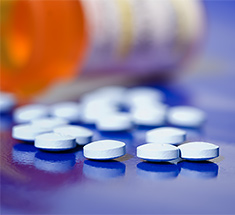
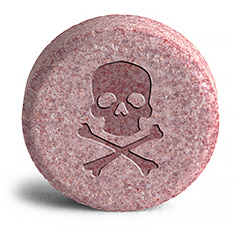
How to keep your dog safe
You know that message on the label that says, “Keep out of reach of children”? Consider your dog to be just as important as your child. Don’t leave your medications (in or out of the bottle) anyplace where your dog can reach them.

Remember: having a dog in the house is just about equivalent to having a toddler, even if your dog is older. Dogs require supervision anytime they are allowed to roam free in your house, unless you have done a very good job of dog-proofing.
If you drop a pill, make sure you find it. There is no pill fairy that will come around and sweep it up before your dog gets to it.
If your dog does get into any human medication, contact your veterinarian immediately. If it’s after-hours, call your local emergency vet clinic or the ASPCA Animal Poison Control Center at 1-888-426-4435. There may be a charge associated with their advice, but isn’t your pet worth it?
Don’t automatically assume you should make your dog throw up after he or she ingests a poison. Some poisons are best followed by a chaser of something that neutralizes them, while others need to be brought back up. For example, if your dog would happen to swallow drain cleaner, having him throw it back up simply doubles the burn damage done to his esophagus and mouth.
The poison control center can give you the best advice on how to help your dog. They can also tell you whether or not you need to worry, based on the size of your dog and the amount of medication they took.
When you call, be sure to have the pill bottle (or what’s left of it) on hand so you can give the correct drug name and can estimate the number of pills your dog may have ingested, based on the date you last filled the prescription and the number of pills remaining.
Doggies Den: Latest Articles
 Homemade Thanksgiving Treats for Your Dog
Homemade Thanksgiving Treats for Your Dog
NUTRITION We all want to include our dogs in our holiday celebrations, but hopefully, you're aware that sharing table scraps with your dog isn't always the best idea.
 Keeping Your Dog Safe during the Summer Months
Keeping Your Dog Safe during the Summer Months
HEALTH Summer is coming on fast, so it’s time to plan how you will keep your dog safe and healthy through the lazy, carefree, warm days.
 Vaccination Time Again-Keeping Your Puppy Healthy
Vaccination Time Again-Keeping Your Puppy Healthy
DOG HEALTH So you have your new puppy picked out. There are quite a few shots, treatments and examinations that will keep the newest member of your family healthy.
 Canine Thanksgiving Feast
Canine Thanksgiving Feast
NUTRITION With the wide variety of food at Thanksgiving dinner, chances are you'll want to give your dog something special, too. If you're contemplating what to feed your dog for the holiday, here is a guide to a great Canine Thanksgiving Feast.
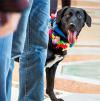 Dog Walking Tips Every Owner Should Know
Dog Walking Tips Every Owner Should Know
DOG FUN Walking your dog is not only crucial to keeping him healthy and happy, it strengthens the bond between your canine friend and his caregiver. There are a lot of obstacles out there. Don’t forget these simple tips to keep your walk fun and safe in the outside world.
 The Benefits of Physiotherapy for your Dog
The Benefits of Physiotherapy for your Dog
HEALTH The same techniques that physiotherapists use to treat a variety of injuries and conditions in humans have been adapted to suit animals with great success. Family pets, show dogs, and working dogs can all benefit greatly from physiotherapy. Dogs whose activities involve a lot of agility are especially susceptible to the types of problems that physiotherapy can address.
 The Decision- Adding a Dog to Your Family
The Decision- Adding a Dog to Your Family
FIRST TIME OWNERSBringing a dog into your family is a decision where many people don’t realize it’s magnitude until after they have the dog. There are a number of things that you need to research before you decide to purchase a dog, and it starts right in your own home.
 Bringing Your Dog Into Your New Baby's Life
Bringing Your Dog Into Your New Baby's Life
HEALTH Many believe that a dog and a new baby cannot happily coexist, so therefore the dog has to go. This is not necessarily the case.  A new baby does not mean you have to abandon your dog.

Doggies Den:
Most Popular Articles

Dog Pregnancy Symptoms
HEALTHIf you suspect your dog might be pregnant, check out part one in this series on pregnant dogs, where we cover pregnant dog symptoms.

Dog Birth
HEALTHIn the third article of our dog pregnancy series, we look at the wonderful, but messy, process of bringing newborn puppies into the world.

Indoor Dog Potties
DOG PRODUCTSIt's been a long day at work. You were so busy, you didn't even take time to eat a sandwich, let alone run home to let your dog out. You're on your way home, knowing the poor dog is crossing his or her legs by now, when your car breaks down, delaying you even further. Can't somebody make this easier?
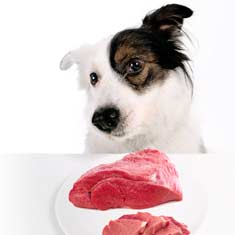
Your Dog’s Digestive System
PHYSIOLOGYEver wonder why your dog eats so fast? Or why he eats gross things? Or why he gets sick to his stomach? Or why his waste stinks so bad? Some of these things are normal, some are not.

Canine Respiratory System
BREATHINGThe basic function of your dog's respiratory system is to bring oxygen in to and remove carbon dioxide from the body. Knowing the symptoms of respiratory diseases can help you help your stay healthy.
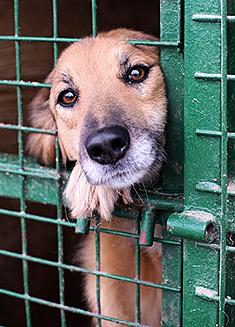
Shelter Dog Adoption Tips for Success
ADOPTION Are you intimidated by the prospect of "rescuing" a dog from a shelter? One reason that you may be wary of adopting a dog from a shelter is not knowing how to choose. Adopting a dog from a shelter can be a rewarding process, if you're prepared to do a reasonable amount of research.
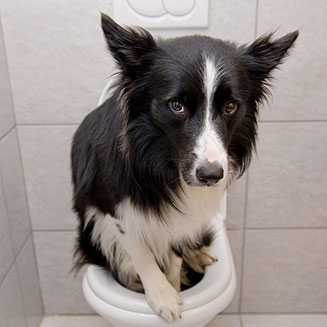
Canine Urinary Tract Infections
SYMPTOMS AND TREATMENTDoes your dog seem to be having trouble relieving his or her bladder? Learn how to recognize the signs of urinary tract infections and how to treat them before they spread.
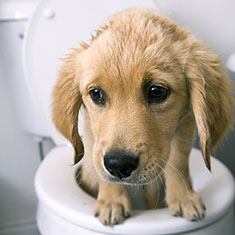
What to do for Dog Diarrhea
SYMPTOMS AND REMEDIESIf you have dogs in your house for any length of time, you have likely experienced at least one bout of dog diarrhea. Beyond the pain in the tuckus involved in cleaning up the mess, you should know what causes diarrhea, and when it's important to see the vet.

What to do for a Dog Bite
DOG BEHAVIOR Getting bitten by a dog can be scary, and you may be tempted to run around in circles for a while, trying to figure out what to do. Here's our guide to help you manage the situation.
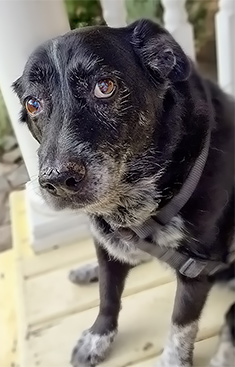
Top Ten Tips for Living with a Senior Dog
DOG HEALTH Bringing home a new puppy is so exciting, but it doesn’t take all that long for your exuberant puppy to grow into a senior dog who may have special needs. Here are the doggies.com top ten tips for taking care of your companion who has been with you through so much.
